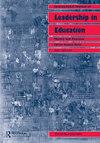使用组织数据识别机构内公平、多样性和包容性的潜在领导者的实践和类型
IF 2.5
Q1 EDUCATION & EDUCATIONAL RESEARCH
International Journal of Leadership in Education
Pub Date : 2023-11-02
DOI:10.1080/13603124.2023.2272157
引用次数: 0
摘要
摘要高校越来越倾向于将其文化转变为更加公平、多元和包容的文化。他们经常追求大型的变革管理项目,部分目的是游说他们的机构,在教员、员工和组织单位中识别潜在的EDI领导者和经纪人。组织数据是EDI调查的良好资源,但是它们很难收集、组织和分析。糟糕的数据分析可以阻止EDI分析,并最终改变管理程序。为了解决这个问题,当我们在一所大型公立大学执行EDI变更管理程序时,我们使用定性编码来迭代一组数据分析工具。我们在这里提出了两种类型和四种实践,以帮助推动者搜索、组织、分析和解释组织数据,以快速识别和迭代潜在的EDI领导者和作为实践社区进一步支持的变更代理池。披露声明作者未报告潜在的利益冲突。本研究得到了美国国家科学基金会[1812428]的支持。作者简介steve Elliott是亚利桑那州立大学科技性别平等中心的附属教员。他的研究重点是科学推理、组织实践和资助研究与发展的机构之间的相互关系。Michael Simeone是亚利桑那州立大学复杂适应系统学院的副教授,在那里他共同领导着信息竞争实验室。他的研究包括多学科数据科学、人类技术网络分析、数据可视化以及连接环境科学和人文科学的数据驱动合作。Kimberly A. Scott,亚利桑那州立大学转型学院教授,科学与技术性别平等中心创始执行主任。她目前的研究探索社会制度如何限制或负担有色人种女孩/妇女成为STEM中的技术社会变革推动者。Elizabeth a . Wentz是亚利桑那州立大学地理科学与城市规划学院的副教务长和院长,也是亚利桑那州立大学地理科学与城市规划学院的教授。她的研究重点是地理技术的设计、实施和评估,特别强调如何利用这些技术来理解城市环境。本文章由计算机程序翻译,如有差异,请以英文原文为准。
Practices and typologies for using organizational data to identify potential leaders for equity, diversity, and inclusion within institutions
ABSTRACTColleges and universities increasingly aim to change their cultures to be more equitable, diverse, and inclusive (EDI). They often pursue large change-management programs that partly aim to canvass their institutions to identify potential EDI leaders and brokers amongfaculty, staff, and organizational units. Organizational data are good resources for EDI canvasses, but they can be difficult to collect, organize, and analyze. Poor data canvasing can forestall EDI canvasses and ultimately change-management programs. To address that problem, we used qualitative coding to iterate a set of data canvasing tools as we conducted EDI change-management programs at a large public university. We present here two typologies and four practices to help canvassers search for, organize, analyze, and interpret organizational data to quickly identify and iterate pools of potential EDI leaders and change agents further supportable as communities of practice. Disclosure statementNo potential conflict of interest was reported by the author(s).Additional informationFundingThe work was supported by the National Science Foundation [1812428].Notes on contributorsSteve ElliottSteve Elliott is Affiliate Faculty in the Center for Gender Equity in Science and Technology at Arizona State University. His research focuses on the interrelations between scientific reasoning, organizational practices, and institutions for funding research and development.Michael SimeoneMichael Simeone is an Associate Research Professor in the School for Complex Adaptive Systems at Arizona State University, where he co-leads the Information Competition Lab. His research includes multidisciplinary data science, analysis of human-technology networks, data visualization, and data-driven collaborations that bridge environmental sciences and humanities.Kimberly A. ScottKimberly A. Scott is Professor in the School of Transformation and the Founding Executive Director of the Center for Gender Equity in Science and Technology at Arizona State University. Her current research explores how social systems constrain or afford girls/women of color to become technosocial change agents in STEM.Elizabeth WentzElizabeth A. Wentz is the Vice Provost and Dean of the Graduate College and a Professor in the School of Geographical Sciences and Urban Planning at Arizona State University. Her research focuses on the design, implementation and evaluation of geographic technologies with particular emphasis on how such technologies can be used to understand urban environments.
求助全文
通过发布文献求助,成功后即可免费获取论文全文。
去求助
来源期刊

International Journal of Leadership in Education
EDUCATION & EDUCATIONAL RESEARCH-
CiteScore
5.10
自引率
14.30%
发文量
65
期刊介绍:
International Journal of Leadership in Education: Theory & Practice is an international journal for the publication of theoretical and practical discussions of educational leadership. The Journal presents: •cutting-edge writing on educational leadership, including instructional supervision, curriculum and teaching development, staff development, educational administration and more; •an alternative voice: reports of alternative theoretical perspectives, alternative methodologies, and alternative experiences of leadership; •a broad definition of leadership, including teachers-as-leaders, shared governance, site-based decision making, and community-school collaborations.
 求助内容:
求助内容: 应助结果提醒方式:
应助结果提醒方式:


